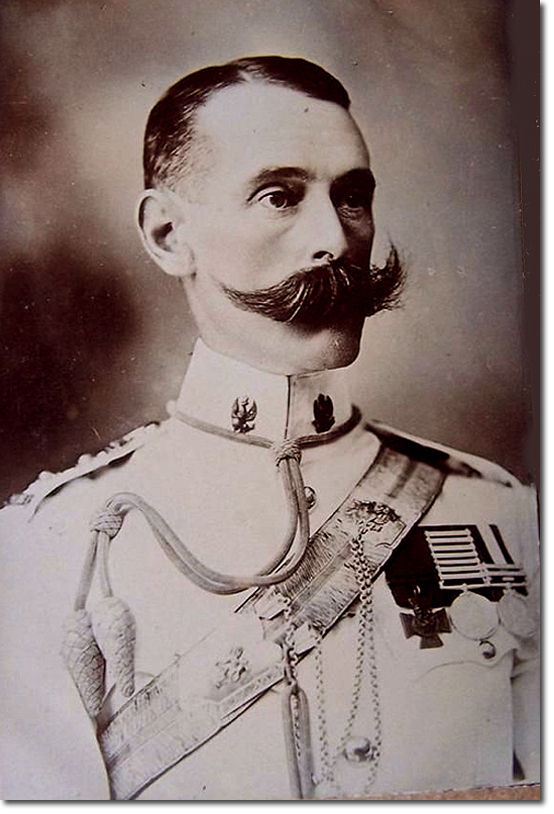|
|

 |
|
Edward Douglas Brown was born in Kasauli, Dagshai, India on 6 Mar 1861, son of Major David Philip Browne, 7th Hussars, and Frances Dorothy daughter of Francis Synge-Hutchinson, and his wife, Lady Louisa Hely-Hutchinson, and sister of Sir Edward Synge-Hutchinson 4th Baronet, of Castle Sailagh, County Wicklow. He was educated at Edinburgh Academy, Windennere College, and at the United Services College, Westward Ho! and entered the Army, commissioned as Lieutenant in the 18th Hussars on 7 Nov 1883. He became a Captain in less than five years, on 8 Aug 1888, and on 27 Mar 1889 he exchanged into the 14th Hussars. From the 1 Jan 1890 to 31 Dec 1894 he was Commandant of the Aldershot School of Instruction for Yeomanry. He became a major on 28 Jan 1899. Major Brown served in South Africa from 1899 to 1902, and at the action of Geluk he won the Victoria Cross for saving the lives of three men, one after the other. He says his age at that time was 37 years 8 months, which was then, he believes, about the limit of antiquity for this decoration. His Victoria Cross was gazetted 15 Jan 1901:
'Edward Douglas Brown, Major, 14th Hussars. Date of Act of Bravery: 13 Oct 1900. On the 13th October 1900, at Geluk, when the enemy were within 400 yards, and bringing a heavy fire to bear, Major Brown, seeing that Sergeant Kersey's horse was shot, stopped behind the last squadron as it was retiring and helped Hersey to mount behind him, carrying him for about three quarters of a mile to a place of safety. He did this under a heavy fire. Major Brown afterwards enabled Lieutenant J G Browne 14th Hussars to mount by holding his horse, which was very restive under the heavy fire. Lieutenant Browne could not otherwise have mounted. Subsequently Major Brown carried Lance Corporal Trumpeter Leigh out of action'. It was not mentioned in the official account that the horses of three other men were held by Major Brown, as they were in difficulties with them, and one of the animals, having run away, had to be caught and brought back. Major Brown was the last officer of the British Regular Army to win the Victoria Cross in the life-time of Queen Victoria, as she died on the 22nd January 1901. He was decorated by Duke of Cornwall and York at Pietermaritzburg, Natal, on the 14th August 1901. He was mentioned in Despatches: (1) In the London Gazette of 1 Dec 1901, by Sir John French (2) By Lord Roberts and by Lord Kitchener. He was mentioned regimentally during the Boer War: (1) For service during the retirement at Thaba N'chu. (2) For leading to the most advanced position at the Battle of Diamond Hill under heavy fire. (3) For saving life at the Second Action of Geluk 13 October 1900. (4) For General Distinguished Service during the war. (5) Brevet of Lieutenant Colonel 17 June, 1902 (ante-dated to 29 November 1900). He received the Queen's South African Medal with seven clasps, and the King's South African Medal with two clasps. He commanded the 14th Hussars for seven and a half months during the Boer War. Although he was born as Edward Douglas Brown, in 1904, he took the name but not the title of his uncle, Sir Edward Synge-Hutchinson, to become Edward Douglas Browne-Synge-Hutchinson VC. He was also the nephew of Lieutenant General Coote Synge-Hutchinson. In 1906 he was given the Brevet of Colonel, and in 1911 he became Substantive Colonel. In the same year he was made a Knight of Grace of the Order of St John of Jerusalem in England and a Member of the Central Executive Committee of the St John's Ambulance Association 1911 to 1919. He was also made a Freeman and Liveryman of the Worshipful Company of Spectacle Makers of the City of London, and Freeman of the City of London, 1911. He was created a CB in 1911. On 30 March, 1917, Colonel Browne-Synge-Hutchinson was promoted to be Knight of Justice of the Order of St John of Jerusalem. He died in London on 3 March 1940. |
Regimental Details | 14th Hussars Commanding Officers
Armed Forces | Art and Culture | Articles | Biographies | Colonies | Discussion | Glossary | Home | Library | Links | Map Room | Sources and Media | Science and Technology | Search | Student Zone | Timelines | TV & Film | Wargames